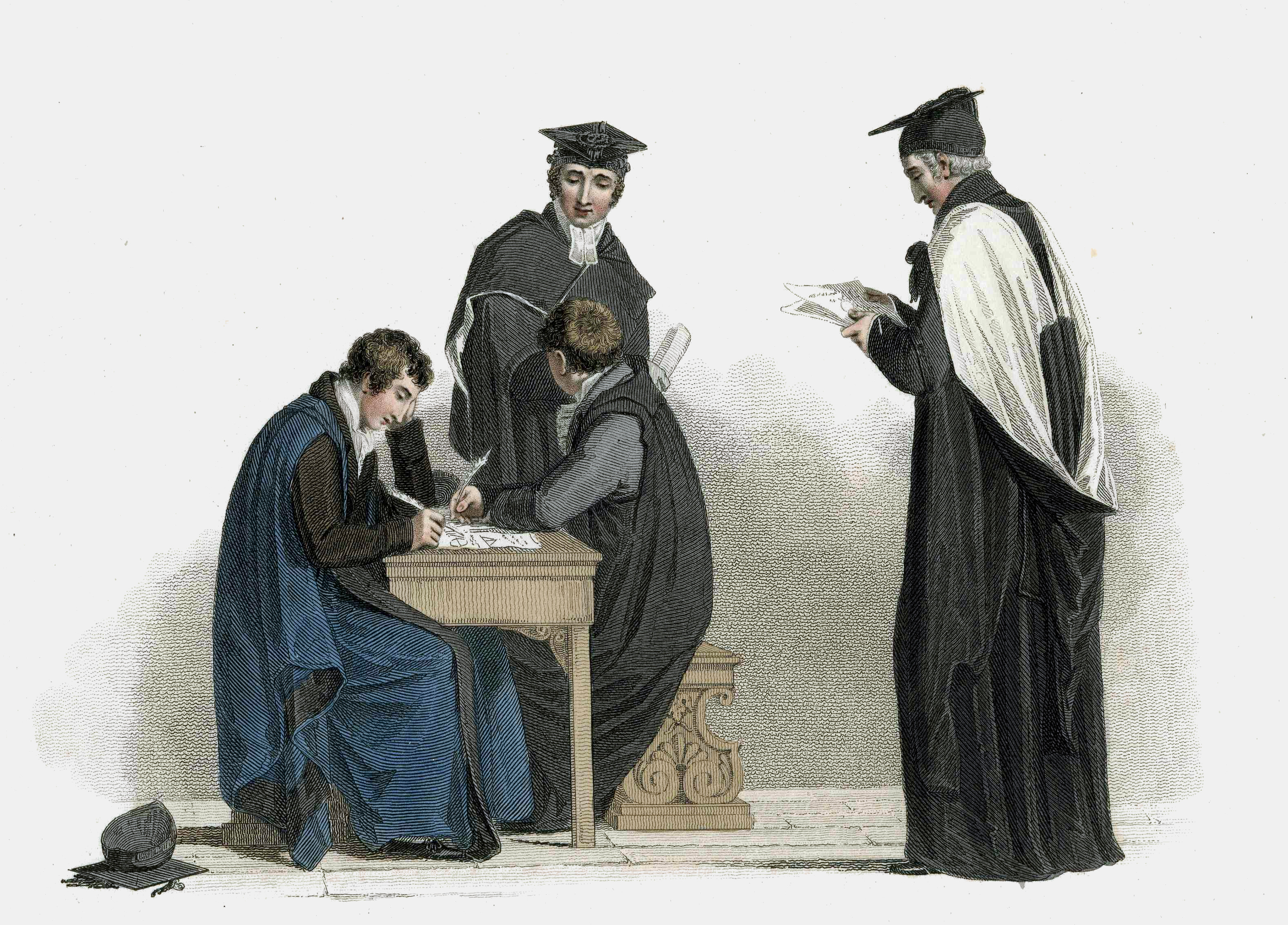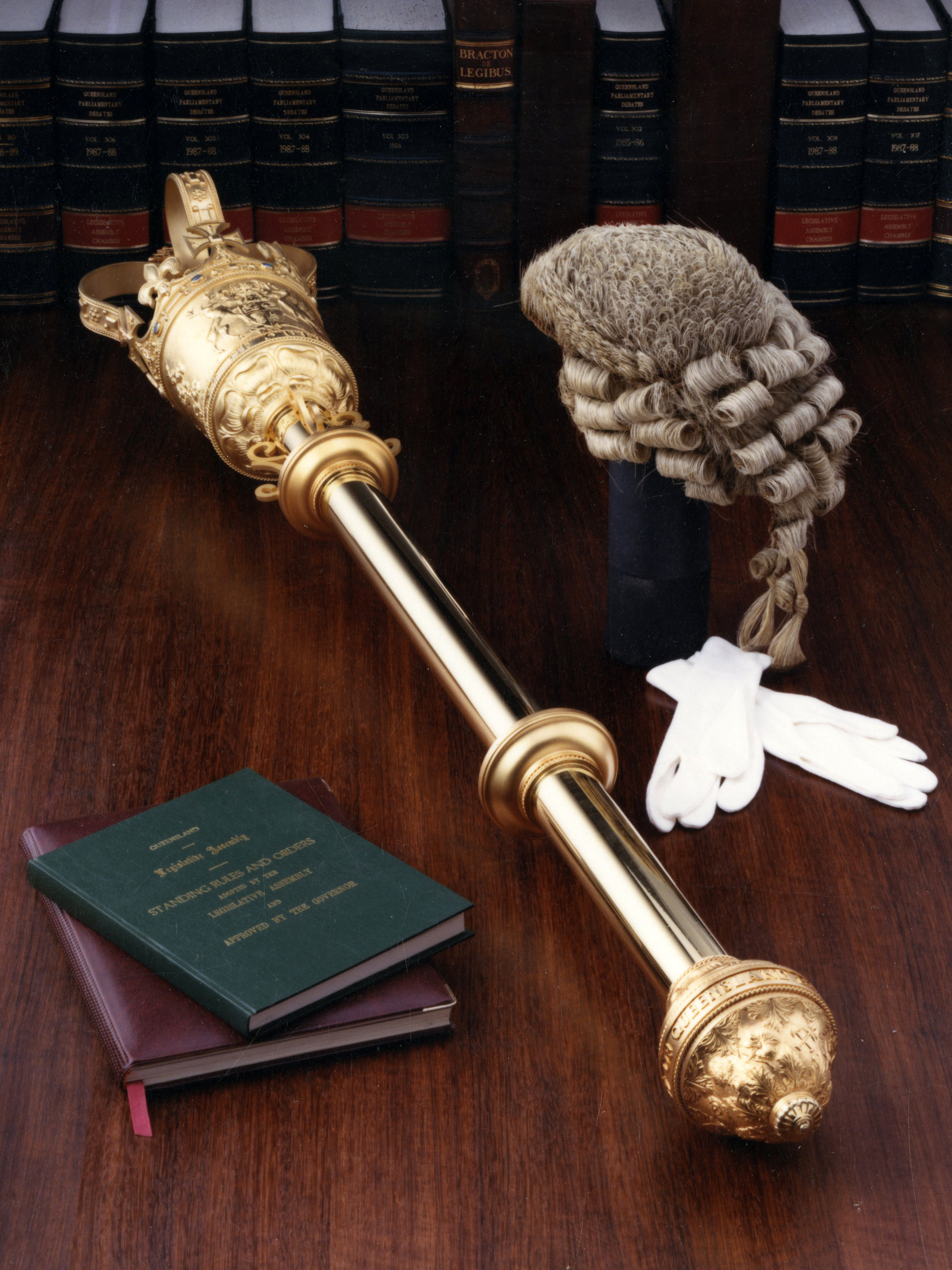|
Servitor
In certain university, universities (including some Colleges of the University of Oxford, colleges of University of Oxford and the University of Edinburgh), a servitor was an undergraduate student who received free accommodation (and some free meals), and was exempted from paying fees for lectures. The term is still used at the University of Edinburgh, where it refers to the staff who are responsible for security, mail and reception (similar to Porter (college), porters at other universities) and are also on duty at formal occasions, when their functions include carrying the Ceremonial mace, mace and Usher (occupation), ushering. At Oxford, servitors were originally expected to act as servants to the Fellow#Oxford, Cambridge and Dublin, fellows of their college. By 1852, this requirement had largely fallen into disuse, and the term had been replaced (often by Clerk (position), clerk or Bible-clerk) at most colleges. The last recorded use of the term in Oxford was in 1867 (at Chris ... [...More Info...] [...Related Items...] OR: [Wikipedia] [Google] [Baidu] |
Sizar
At Trinity College Dublin and the University of Cambridge, a sizar is an Undergraduate education, undergraduate who receives some form of assistance such as meals, lower fees or lodging during his or her period of study, in some cases in return for doing a defined job. Etymology The word is thought to derive from the "sizes" or "sizings" (in turn a shortened form of "assize"), which were the specified portions of food and drink made available at a fixed price at the college. One of the sizar's duties was, historically, to fetch the "sizes" for his colleagues. History University of Cambridge At Cambridge, a sizar was originally an undergraduate student who financed his studies by undertaking more or less menial tasks within his college but, as time went on, was increasingly likely to receive small grants from the college. Certain colleges, including St John's College, Cambridge, St John's and Trinity College, Cambridge, Trinity, distinguished between two categories of sizar: ... [...More Info...] [...Related Items...] OR: [Wikipedia] [Google] [Baidu] |
University
A university () is an educational institution, institution of tertiary education and research which awards academic degrees in several Discipline (academia), academic disciplines. ''University'' is derived from the Latin phrase , which roughly means "community of teachers and scholars". Universities typically offer both undergraduate education, undergraduate and postgraduate education, postgraduate programs. The first universities in Europe were established by Catholic Church, Catholic monks. The University of Bologna (), Italy, which was founded in 1088, is the first university in the sense of: *being a high degree-awarding institute. *using the word (which was coined at its foundation). *having independence from the ecclesiastic schools and issuing secular as well as non-secular degrees (with teaching conducted by both clergy and non-clergy): grammar, rhetoric, logic, theology, canon law and notarial law.Hunt Janin: "The university in medieval life, 1179–1499", McFarland, 2 ... [...More Info...] [...Related Items...] OR: [Wikipedia] [Google] [Baidu] |
Clerk (position)
A clerk is a white-collar worker who conducts record keeping as well as general office tasks, or a worker who performs similar sales-related tasks in a retail environment. The responsibilities of clerical workers commonly include Records management, record keeping, filing, staffing service counters, screening callers, and other administrative tasks. In City of London Livery company, livery companies, the clerk is the chief executive officer. History and etymology The word ''clerk'' is derived from the Latin ''clericus'' meaning "cleric" or "clergyman", which is the Latinisation of names, latinisation of the Greek language, Greek ''κληρικός'' (''klērikos'') from a word meaning a "lot" (in the sense of drawing lots) and hence an "apportionment" or "area of land". Henry George Liddell, Robert S ... [...More Info...] [...Related Items...] OR: [Wikipedia] [Google] [Baidu] |
History Of Education In The United Kingdom
{{sia ...
For History of education in the United Kingdom, see: *History of education in England * History of education in Scotland * History of education in Wales * History of education in Northern Ireland ** History of education in Ireland (pre 1922) ** Education in Northern Ireland (post 1922) See also *Education in the United Kingdom Education in the United Kingdom is a devolved matter, with each of the countries of the United Kingdom having separate systems under separate governments. The UK Government is responsible for England, whilst the Scottish Government, the Welsh ... [...More Info...] [...Related Items...] OR: [Wikipedia] [Google] [Baidu] |
Batteler
Battel, or battels, sometimes spelled batells ( Magdalen), or batels ( Brasenose) is a term used originally in the University of Oxford and later also at the University of Durham to refer to food ordered by members of the college as distinct from the usual commons. Hence, it also referred to college accounts for board and provisions supplied from kitchen and buttery and, generally, the whole of a person's college accounts. Though the distinction from commons is no longer relevant, the term persists as the name for members' termly bills at many colleges at the Universities of Oxford and Durham. Batteler (later, a resident in a college) was originally a rank of students between commoners and servitors who, as the name implies, were not supplied with "commons", but only such provisions as they ordered for themselves. History The inventory of Henry Thorlthorpe, a Vicar Choral of the church of Saint Peter in York—the Minster—who died in 1426, includes in the debt ... [...More Info...] [...Related Items...] OR: [Wikipedia] [Google] [Baidu] |
University Of Cambridge
The University of Cambridge is a Public university, public collegiate university, collegiate research university in Cambridge, England. Founded in 1209, the University of Cambridge is the List of oldest universities in continuous operation, world's third-oldest university in continuous operation. The university's founding followed the arrival of scholars who left the University of Oxford for Cambridge after a dispute with local townspeople. The two ancient university, ancient English universities, although sometimes described as rivals, share many common features and are often jointly referred to as Oxbridge. In 1231, 22 years after its founding, the university was recognised with a royal charter, granted by Henry III of England, King Henry III. The University of Cambridge includes colleges of the University of Cambridge, 31 semi-autonomous constituent colleges and List of institutions of the University of Cambridge#Schools, Faculties, and Departments, over 150 academic departm ... [...More Info...] [...Related Items...] OR: [Wikipedia] [Google] [Baidu] |
Exhibitioner
An exhibition is a type of historical financial scholarship or bursary awarded in the United Kingdom and Ireland. Purpose An exhibition is historically a small financial award or grant, of lower status than a "scholarship", given to an individual student based normally on grounds of merit or demonstrable necessity. They have been used at universities of Dublin, Oxford, Cambridge and Sheffield, as well as some public schools and other UK educational establishments. The recipient of such an award is known as an exhibitioner (just as a ''scholar'', in this context, is one who has been awarded a scholarship). The term is in decline because financial assistance to students is increasingly given on the grounds of need rather than scholastic merit, and because the value of historically long-standing exhibitions has dwindled due to inflation. Originally, these awards were only made to males. In 1873, Annie Rogers came top in Oxford's entrance examinations and she was automatically q ... [...More Info...] [...Related Items...] OR: [Wikipedia] [Google] [Baidu] |
Christ Church, Oxford
Christ Church (, the temple or house, ''wikt:aedes, ædes'', of Christ, and thus sometimes known as "The House") is a Colleges of the University of Oxford, constituent college of the University of Oxford in England. Founded in 1546 by Henry VIII of England, King Henry VIII, the college is uniquely a joint foundation of the university and the cathedral of the Oxford diocese, Christ Church Cathedral, Oxford, Christ Church Cathedral, which also serves as the college chapel and whose Dean of Christ Church, Oxford, dean is ''ex officio'' the college head. As of 2022, the college had 661 students. Its grounds contain a number of architecturally significant buildings including Tom Tower (designed by Christopher Wren, Sir Christopher Wren), Tom Quad (the largest quadrangle in Oxford), and the Great Dining Hall, which was the seat of the Oxford Parliament (1644), parliament assembled by Charles I of England, King Charles I during the English Civil War. The buildings have inspired repli ... [...More Info...] [...Related Items...] OR: [Wikipedia] [Google] [Baidu] |
Fellow
A fellow is a title and form of address for distinguished, learned, or skilled individuals in academia, medicine, research, and industry. The exact meaning of the term differs in each field. In learned society, learned or professional society, professional societies, the term refers to a privileged member who is specially elected in recognition of their work and achievements. Within institutions of higher education, a fellow is a member of a highly ranked group of teachers at a particular college or university or a member of the governing body in some universities. It can also be a specially selected postgraduate student who has been appointed to a post (called a fellowship) granting a stipend, research facilities and other privileges for a fixed period (usually one year or more) in order to undertake some advanced study or research, often in return for teaching services. In the context of medical education in North America, a fellow is a physician who is undergoing a supervised, ... [...More Info...] [...Related Items...] OR: [Wikipedia] [Google] [Baidu] |
Colleges Of The University Of Oxford
The University of Oxford has 36 colleges within universities in the United Kingdom#Traditional collegiate universities, colleges, three societies, and four permanent private halls (PPHs) of religious foundation. The colleges and PPHs are autonomous self-governing corporations within the university. These colleges are not only houses of residence, but have substantial responsibility for teaching undergraduate students. Generally tutorials (one of the main methods of teaching in Oxford) and classes are the responsibility of colleges, while lectures, examinations, laboratories, and the central library are run by the university. Students normally have most of their tutorials in their own college, but often have a couple of modules taught at other colleges or even at faculties and departments. Most colleges take both graduates and undergraduates, but several are for graduates only. Undergraduate and graduate students may name preferred colleges in their applications. For undergradua ... [...More Info...] [...Related Items...] OR: [Wikipedia] [Google] [Baidu] |
Usher (occupation)
An usher is a person who welcomes and shows people where to sit, especially at a church, theatre or when attending a wedding. History The word comes from the Latin '' ostiarius'' ("porter", "doorman") through Norman French, and is a cognate of the French '' huissier''. Ushers were servants or courtiers who showed or ushered visitors in and out of meetings in large houses or palaces. In the United Kingdom, a variety of titles for courtiers in the Royal Household include the word ''usher''. In England, Wales, Scotland and Ireland, from the early sixteenth century until at least the end of the nineteenth century, the term denoted an assistant to a schoolmaster or head-teacher; an under-master, assistant-master. In such use, however, the term is now rare. Duties Ushers assist visitors by formally showing the way in a large building or to their appropriate seats. This may coincide with a security role. At weddings, friends of the groom and bride may be recruited to direct gu ... [...More Info...] [...Related Items...] OR: [Wikipedia] [Google] [Baidu] |
Ceremonial Mace
A ceremonial mace is a highly ornamented staff of metal or wood, carried before a Head of state, sovereign or other high officials in civic ceremonies by a mace-bearer, intended to represent the official's authority. The mace, as used today, derives from the original mace (bludgeon), mace used as a weapon. Processions often feature maces, as on parliamentary or formal academic occasions. History Ancient Near East Ceremonial maces originated in the Ancient Near East, where they were used as symbols of rank and authority across the region during the late Stone Age, Bronze Age, and early Iron Age. Among the oldest known ceremonial maceheads are the Ancient Egyptian Scorpion Macehead and Narmer Macehead; both are elaborately engraved with royal scenes, although their precise role and symbolism are obscure. In later Mesopotamian art, the mace is more clearly associated with authority; by the First Babylonian dynasty, Old Babylonian period the most common figure on cylinder seals ... [...More Info...] [...Related Items...] OR: [Wikipedia] [Google] [Baidu] |






